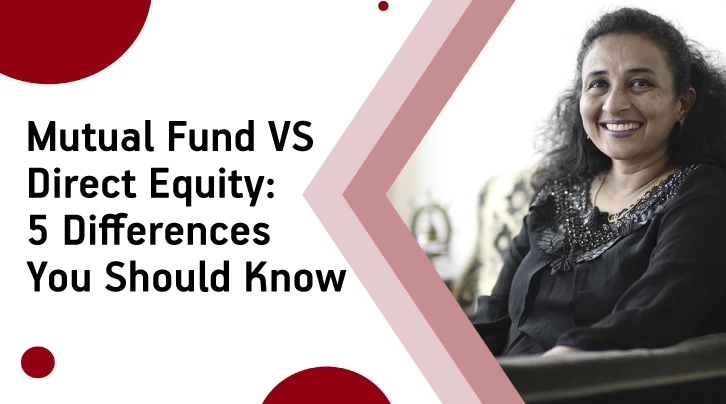Mutual funds and direct equity investments are gaining widespread popularity in India. But if you have to choose one, what should you pick? Read this post to know some of the biggest differences between the two to make an informed decision.
Equity has long been among the most popular asset classes for long-term investment. But as equity is a high-risk-high-return potential investment avenue, many Indian investors prefer investing in mutual funds.
But if you had to choose between the two, what should your selection be? Understanding the most significant differences between equity VS mutual funds can help make the selection easier. Take a look-
What is Mutual Fund?
A mutual fund is a pooled investment vehicle. A mutual fund scheme pools money from investors and invests across asset classes per the scheme's objectives. Every scheme has a fund manager responsible for managing the investment on behalf of the investors.
There are many different types of mutual funds in India, including equity, debt, hybrid, solution-oriented, and other schemes like index funds, fund of funds, and more.
Click Here to know what is mutual Fund?
What is Direct Equity Investment?
Direct equity investment is when you directly invest in the stock market through your Demat and trading account. It requires you to constantly analyze stocks with good future potential and invest your capital in those stocks.
Unlike mutual funds, where you have an experienced fund manager to manage the investment, direct equity investment requires investors to make investment decisions on their own.
Direct Equity VS Mutual Funds
What is the biggest difference between equity and mutual fund investment? Let’s take a look-
-
Professional Management
New investors in the stock market generally lack the knowledge and skills to select the right stocks. Not to forget, analyzing stocks based on their fundamentals and technicals is time-consuming.
But with mutual funds, you get the expertise of a professional fund manager who takes active investment decisions on your behalf. More importantly, these decisions are taken based on the scheme’s investment objective. Hence, you don’t have to worry about making regular investment decisions to optimize your returns.
Also Read - What is Equity Fund?
-
Volatility
Another significant difference between direct equity VS mutual fund is their volatility. Individual stocks are known to be more volatile. Any sudden movement in the stock market could make new investors jittery and impact their decision-making capabilities.
With mutual funds, you can invest in various asset classes through all the different fund categories. While stock market volatility impacts mutual funds like equity funds, they're better positioned to handle short-term volatilities. This is majorly due to diversification and skilful fund management.
-
Risk
Equity as an asset class is known to be riskier. However, the risk profile generally varies between stocks across market capitalizations. But ultimately, market forces determine market direction, and no stock is immune from sudden setbacks and declines.
Every mutual fund category carries some level of potential risk. However, certain fund categories like equity are considered to be potentially riskier than funds like debt funds due to the assets where they make their investments. Investors can choose between low-risk to very high-risk mutual funds, which is clearly mentioned through a ‘Riskometer’ graph in the Scheme Information Document (SID) of every scheme.
This makes mutual funds highly flexible as there are schemes for every risk appetite.
Also Read - What is Debt Fund?
-
Cost and Taxes
As mentioned above, you’ll require a Demat account and trading to invest in equity directly. Stock brokers charge some brokerage, along with an annual account maintenance fee. In addition, Short-Term Capital Gains (STCG) and Long-Term Capital Gains (LTCG) tax apply to the gains generated from equity investments. Share trading also attracts STT (Securities Transaction Tax).
With mutual funds, fund houses charge a fee in the form of an expense ratio that is capped by SEBI. STCG and LTCG taxes also apply to the gains made from mutual fund investments. As for STT, it applies only to equity and equity-oriented mutual funds.
-
Investment Amount
There’s no minimum amount for direct stock investment. You can start investing with any amount you’re comfortable with and purchase even one share. However, several stocks on the Indian indices trade at a very high price, making them inaccessible for someone with a smaller capital.
But if you want to invest in mutual funds, you can start investing with as little as Rs. 1,000. Moreover, you can also consider starting a Systematic Investment Plan (SIP) in your preferred scheme with only Rs. 500 per month. But note that the minimum investment amount can vary between schemes and fund houses.
Click Here to know what is SIP(Systematic Investment Plan)?
What Should You Select Between Direct Equity and Equity Mutual Funds?
The selection between mutual fund VS direct equity ultimately depends on investors and their preferences. If you’re new to investments, the variety of mutual funds and their professional management can prove beneficial. Moreover, the low entry barrier makes them a good choice even for investors with smaller capital.
However, if you’re an experienced investor who understands the working of the stock market, direct equity can be an option.
But whether you go for direct stock investment or take the route of mutual fund investments, it’s essential to build a well-rounded portfolio in line with your financial goals and risk profile.
Also Read About - What is the Minimum Investment in Mutual Funds?
Mutual Fund investments are subject to market risks, read all scheme related documents carefully.





 1800-270-7000
1800-270-7000




